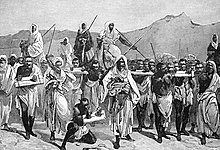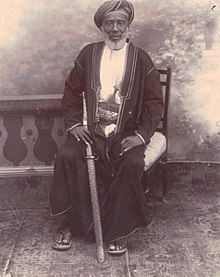Arab slave trade
slave trade in the Arab world between the 7th and 20th centuries
The Arab slave trade is the intersection of slavery and trade surrounding the Arab world and Indian Ocean, mainly in Western and Central Asia, Northern and Eastern Africa, India, and Europe. This trade occurred chiefly between the medieval era and the early 20th century, through slave markets in these areas, with the slaves captured mostly from Africa's interior, Southern and Eastern Europe, the Caucasus, and Central Asia.



Quotes
edit- A document from the twelfth century tells of the tricks used by sellers of slaves in the Muslim slave markets: merchants would put ointments on slave girls of a darker complexion to whiten their faces; brunettes were placed for four hours in a solution to make them blond (“golden”); ointments were placed on the face and body of black slaves to make them “prettier.”
- Fernández-Morera, Darío - The myth of the Andalusian paradise muslims, christians, and jews under islamic rule in medieval Spain-Intercollegiate Studies Institute_ISI Books (2018)
- In time, the multiracial character of slavery in the Arab world virtually ceased to exist and became almost exclusively black. In this respect, it differed little from slavery in the New World. ... As long as slavery maintained a multiracial cast, Arab and Turkish slave owner favored white slaves over blacks in so far as work assignments and what might be called career prospects were concerned. White slave girls were preferred as concubines over black girls; and among the latter, the fairer-complexioned Abyssinians were shown partiality over their darker-skinned African sisters.
- Gordon, M. (1998). Slavery in the Arab World. Lanham: New Amsterdam Books. page 98 ff
- It has long been considered a mark of ethnocentric ignorance to equate servitude in Islamic societies with the brutal racial slavery that seemed to curse the New World with unending guilt. Ironically, the very “orientalism” that enabled nineteenth-century Europeans to project their own fears and longings upon an unchanging, exotic, and antipodal “East” also led many anti-Western Westerners to romanticize or defend black slavery in the Islamic world. In 1887, for example, the Dutch orientalist C. Snouck Hurgronje ridiculed the “fantasies” that propelled what he concluded to be Britain’s wholly inappropriate efforts to stop the slave trade from Africa to the Middle East.
- About black slavery in the Islamic world. Slaves in Islam, David Brion Davis, 1990, in New York Review of Books. [1]
- The Arabs, who may be regarded as the man-hunting gang, are already weakened by the measures adopted. Recent events in the German possessions on the east coast, will both destroy the Arab prestige and increase our influence in ihe interior. . . The abolition of the abominable trade in human flesh will be accomplished, provided the necessary means are forthcoming.
- Every proposition having for its object the establishment of trade in Africa and the improvement of the black race, said Sir Samuel Baker, will remain Utopian as long as the slave-trade exists
- In the west much has been done of late years to bring about a more rational and humane state of things; but in the east the Arab advances continually followed by a procession of misery and desolation and growing stronger from day to-day to the detriment of the natives. How long will Europe permit this shame, how long will she be fooled by these scoundrels?
- The first step towards the regeneration of the black man is the destruction of the destroyer of the African race, of the adventurer whose power daily increases, in a word, of the Arab.
- As long as Europe is not strong enough to follow up the results already obtained by her voyages of discovery, the explorer can never be satisfied with his work; it will have injured rather than benefited the native races. People hesitate before resorting to extreme measures, but they lose sight of the fact that, if their efforts were concentrated on a single object, more would be done in a day for the real welfare of Africa than has been accomplished in past decades, nay even in past-centuries.
- All over Africa, dried human skeletons show that the slave-trader has passed.
- New Africa; an essay on government civilization in new countries, and on the foundation, organization and administration of the Congo Free State, THE ORIENTAL SLAVE-TRADE, Page 130. lm Herzen von Afrika (French Translation by Lorcan I., pp. 62 ss.
- All I can say in my solitude is, may Heaven's rich blessing come down on every one American, English, Turk who will help to heal this open sore of the world.
- New Africa; an essay on government civilization in new countries, and on the foundation, organization and administration of the Congo Free State, THE ANTI-SLAVERY MOVEMENT, Page 137-138. Personal Life of Livingstone. W. S. Blackie, London, 1880.
- The time has now fully arrived when the several nations of Europe who, at the Congress of Vienna, in 1815, and again at the Conference of Verona, in 1822, issued a series of resolutions strongly denouncing the slave-trade, should take the needful steps for giving them a full and practical effect. And, inasmuch as Ike Arab marauders (whose murderous devastations are now depopulating Africa) are subject to no law, and under no responsible rule, it devolves on the Powers of Europe to secure their suppression throughout all territories over which they have any control. This meeting would, therefore, urge upon Her Majesty's Government, in concert with those Powers who now claim either territorial possession or territorial influence in Africa, to adopt such measures as shall secure the extinction of the devastating slave-trade which is now carried on by those enemies of the human race.
- New Africa; an essay on government civilization in new countries, and on the foundation, organization and administration of the Congo Free State, THE BRUSSELS CONFERENCE, Page 141. The formerly Foreign Secretary under the presidency of Lord Granville on the motion of Cardinal Manning In England at the meeting held in London on July 31, 1888. - Times, August 1, 1888.
- The change which has occurred in the political condition of the African Coast, today calls for common action on the part of the Powers responsible for the control of that Coast. That action should tend to close all foreign slave markets and should also result in putting down slave hunting in the interior. The great work undertaken by the King of the Belgians, in the constitution of the Congo State, and the lively interest taken by His Majesty in all questions affecting the welfare of the African races, lead Her Majesty's Government to hope that Belgium will be disposed to take the initiative in inviting the Powers to meet in Conference at Brussels, in order to consider the best means of attaining the gradual suppression of the slave-trade on the Continent of Africa and the immediate closing of all the outside markets which the slave-trade daily continues to supply.
- New Africa; an essay on government civilization in new countries, and on the foundation, organization and administration of the Congo Free State, THE BRUSSELS CONFERENCE, Page 141. British Minister to the Belgian Court On September 17, 1888.